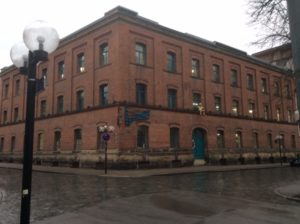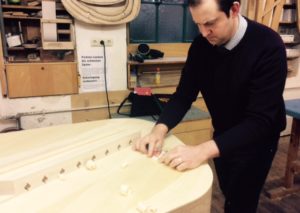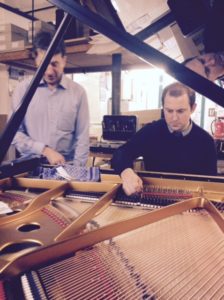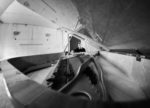Piano Maker’s Corner: Once In A Lifetime

I don’t use the term “once in a lifetime” very much. Because quite honestly, it’s rare that something really is deserving of that description. My recent trip to the piano factory of Steingraeber und Söhne in Bayreuth, Germany however, is fully deserving of that accolade.
During my first week at Phoenix Pianos I remember Richard Dain coming down from his office to tell me he’d had an email from Udo Steingraeber inviting me to come to his factory to work for a few days.
For those that might not know the situation, Steingraeber helps us with the construction of our Phoenix range, casting our frames and bending the rims for our grands, so we have a very good relationship with them. On occasion, their technicians have come to work at our workshops in Kent for a few days.
I’ve tried to explain to a few friends about the magnitude of this invitation. As a piano technician, being invited by Herr Steingraeber to work in his factory is similar to a car mechanic being invited by Mr. Ferrari (for me at least).
I liaised with their Production Manager to organise the factory visit, where he offered me some advanced concert preparation training. The technicians at Steingraeber are world renowned for their skill, so a chance to hone my own regarding regulation and prep for a concert was something I was eager to take them up on.
So a few weeks back, my exciting trip finally happened. I flew from London to Nuremberg and then took a train to Bayreuth, a small Bavarian town where the factory is located. It’s a beautiful part of the world. I was met at the station and driven to Steingraeber Haus, the family residence that doubles up as a showroom and museum, which is opposite the factory building. I was staying in the onsite apartment, usually reserved for visiting concert pianists. It was beautifully decorated and even had a E272 Concert Grand in the concert room which is immediately outside the front door!
Udo Steingraeber came out of the main door of the to greet me. “We have quite the schedule for you Doug!”, he said. “Quite the schedule? For concert prep?” I thought. Udo presented me with my “official timetable” – I did indeed have a lot to do! To my surprise, I had the privilege of helping out in almost every department of the factory, from hammer pre-voicing (toning and shaping hammers before they’re glued onto the action) to soundboard planing and voicing (where sand is sprinkled onto the soundboard before

striking the bridge with a mallet. The shape that the sand makes due to the vibrations tells us whether the soundboard is planed thin enough or not). Udo was right, it was quite the schedule.
Many of the areas I worked in were jobs I was familiar with, but watching the incredible craftsmen and women of Steingraeber gave me many new ideas and techniques. Many of them used homemade jigs for certain jobs to make their lives easier – all of which I took photos of and intend to copy for my own benefit when working on our Phoenix models! I’ve always found it interesting to watch someone else do a job I’m used to. However long you’ve been doing a job, I find you can always learn a new method or technique from someone else. It’s a great way to enhance your own skills.
One of the highlights of my trip though, came on my second evening in Bayreuth. My schedule simply said: Evening with Udo Steingraeber. So, I had no idea what to expect, but I knew I was in for a great evening. Udo Steingraeber is one of the most interesting people I’ve ever met. His passion for his pianos and his knowledge about their construction was quite incredible. Often during my trip I would see him in the factory either playing the pianos that were almost finished to check them over or even getting “hands on” with the construction itself!
After a short guided tour of Bayreuth (which has incredible connections to Wagner, Liszt, Schumann and even Mozart) Udo and I went for a traditional Franconian dinner. (I’ve always heard bad things about German food, all of which I’ve decided is complete nonsense!) We had a fascinating evening of conversation covering his family history and how he came to be head the company and various aspects of piano design. If I could I’d write everything down here but I can’t! It really was one of the most insightful conversations about pianos I’ve ever had. Piano Addict’s paradise!
The most fascinating though was our conversation about the responsibilities of a concert technician. I had always taken such a job very seriously. The tuning and regulating of a concert grand is not to be taken lightly. Something out of place can ruin the experience of performing for the artist and therefore also spoil it for the audience. It is a huge responsibility.
Udo helped me to realise however, that being a good concert technician goes far beyond thinking about the instrument. How? As piano technicians, we are responsible also for the stage lighting. Does it cast a shadow across the keys? The positioning of the piano on the stage. It doesn’t matter if we think it’s right, how does the artist feel?
It is our responsibility to ensure the artist is collected from their hotel and brought to the concert hall. Is the artist comfortable backstage? Does he or she have the right refreshments? We must know their style of performing. Be sure to have listened to their last five releases. Read the reviews. Know what was good, what wasn’t so good and have the positives in mind to talk about to help put the artist at ease.
If the artist has a request 10 minutes before showtime, even if it seems to be a big task for you, don’t panic. Keep calm. Reassure them that you will deal with it. A relaxed pianist is a happy pianist, which leads to a good performance. And above all else – make sure the piano stool doesn’t squeak!
I realised after this fascinating speech that I had not been viewing my job in the right way. It was about artist management just as much, if not more, than piano tuning and regulation. After our dinner I rushed back to my apartment to write down as much as I could remember of the evening’s conversations, not wishing to forget a single sentence!

The next day was my last in Bayreuth where I spent it fitting an action into a new B192 Grand Piano with their top action fitter, Gerhard. It was another fantastic day, with many new ideas and methods learnt. I’m excited to incorporate these into our Phoenix range and hopefully make them even better.
I saw Udo before I left for the train station. “We think it would be a great idea for you to come back and stay for a week!” he said. “I’d love to!” I replied excitedly. I don’t like to use the term “once in a lifetime” too often. I guess I shouldn’t have used it here either!


